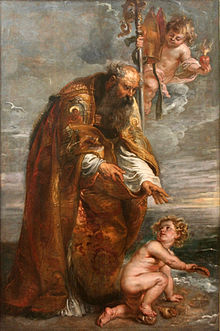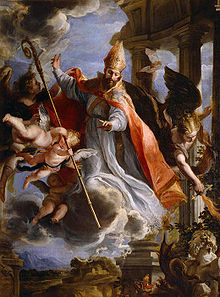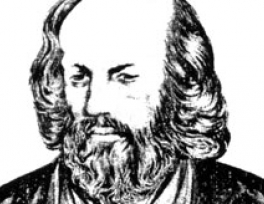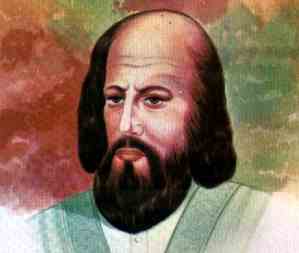
St Augustine by Peter Paul Rubens
Abu Hamid Muhammad Ghazali (Ghazali or al-Ghazali; Al-Gazel in Latin texts) of Persia, in known as maybe the most influential and greatest Islamic theologians. His work is acknowledged by Islamic scholars globally! Once criticized as a teacher he renounced his position and wondered in Syria for years and eventually making his Haj/pilgrimage to Mecca. He then returned and taught in the Sufi order to his disciples until his death!
Aurelius Augustine AKA Saint Augustine of Hippo
Augustine instilled a combination of different religious dogmas (christianity, judaism, buddhist, persian, hinduism, & babylonian) which became known as Al Islam. Augustine became the architect and Muhammad became the prophet. He was a roman catholic bishop, and one of the first fathers of the christian church. Saint Augustine, was a Moor, born on November 13th in Tagaste which is in Algeria North Africa in the year of 354 AD and died August 28 430 AD. His mother Monica was a christian and his father Patricius was a so called pagan.

Adopting Manichaeism a syncretic dualistic religious philosphy taught ny the persian prophet Manes, combining zoroastrianism, christianity, and gnostic thoughts and opposed the imperial ro9man government. This dualistic philosophy dividing the world between good and evil principles. He grew popular in rome and milan after many speeches. He met Ambrose the bishop of milan and was baptized in 387 AD. He returned home to Hippo modern day Annabe Algeria where he lived the rest of his life.

The Triumph of Saint Augustine painted by Claudio Coello, circa. 1664
He was second to Paul as the shaper of the christian theology. His philosophy of the trinity was an answer to arianism, this was an interpretation as in the enchridion. In over 300 sermons he provided insight into the scripture. Augistine reviewed his works in his latter years and revised them in what was called “The Retractions” his feast day is August 28 his death date. Pope Alexander IV, Martin Luther & Gregor Mendel all followed his philosophy! He wrote a book called The City of God! There are cities named after him as well as many churches around the world!
Alleged Depictions of Ghazali Look Doctored?
Ghazali & Augustine Ontology Compared
Ghazali considered ‘existence’ to be a subject of theosophical science and the greatest sought after truth. He believed that ‘existence of being’ really existed. The doubt that Ghazali presented in this regard was an attempt to destroy uncertainty and ignorance. It was not to deny knowing.
Ghazali paid attention to the nature of existence. He wanted to know what existence was. He considered existence as a simple and indivisible concept, and not a combined nature of several things. Existence for him was of one the most obvious concepts upon which the cognition of all things was based. Therefore, he deemed it unnecessary to define existence.
For Ghazali, referring to anything in existence was in fact a reference to God. Existence could be of high and low ranks, all of which remained a manifestation of the single Truth. Existence was deemed to be restricted only to God and His Actions.
Ghazali believed in existential unity. Existence was a beam of the Divine Beauty and, all that things belonged to Him. All things existed because of Him. Nothing had a reality without Him; and the existence of all things was a beam of Light reflecting His Being or Existence.
According to Ghazali, there was nothing in the state of being save God and His Face. Therefore, the real being or existence was peculiar to God, and all things other than Him were a manifestation of His Face.
Whithersoever you turn; there is the Face of God; God is All-Embracing; All- Knowing (Baqarah: 115)
Lasting existence was deemed to be of only for one, and that was God
O which of your Lord’s bounties will you deny? All that dwells upon the earth is perishing. Yet still abides the Face of thy Lord, Majestic Splendid. (Al-Rahman. 25 – 27)
Ghazali’s view and attitude towards existence was monistic. In such a view, existence or reality of being was one basic Reality or Unity. In the light of this view, the difference between different particles of being was focused on a spiritual and meta-material Unity. This opened the way to illuminate the relation of the beings and the Creator.
This view also gave a general meaning to the beings and the particles that formed it, within a spiritual frame. It saw man, as a part of a harmonious whole, not as a remote particle separate from the whole. Man was seen as a being in the world and as interested in leading himself towards the aim of his existence, which was the same as the origin of the world – that is – God. And, he aimed to do so in harmony with that meaningful whole (Rafiei 2002, p. 28-36).
Ghazali considered cognition of God to be the supreme knowledge. He believed that this kind of cognition was the very knowledge that the Prophet of Islam had ordered to be acquired even if necessary through long and troublesome journeys.
Ghazali, like most Muslim scholars, admitted that one should not try to understand the Essence of God because His Essence was such that it was impossible to put forward any question about it. Man’s intellect stood to be quite astonished by comprehension of His quiddity. He maintained that God was beyond our imagination and controversies.
Instead, Ghazali spoke about God’s essence, attributes and actions. He explained such topics as proof of God and His Being (existence and nature, seeing God, God’s essence, attributes actions and names, etc – Rafiei 2002, p.37). Since believing in God was a natural predisposition, Ghazali had deemed that it was unnecessary to prove God, although he did sometimes spoke about proving God.
Ghazali considered proving existence of God from epistemological point of view and he found out that one could not understand presence or non-presence of God through experience. Therefore, he put forward some reasons for proving God and tried to prove him through establishing the fact that this world needed a Creator. He said that there could be no phenomenon unless there was a Creator. And, since the world itself was a phenomenon, then it could not be without the need of having a Creator.
Another way that Ghazali chose to prove God was a posteriori argument. With this approach, it was possible to understand through observation of the creatures that there was a Creator of the world. This was the reason why Ghazali invited people to undertake external and spiritual journey.
Ghazali spoke of the epistemological benefits of the familiarity with the Creation’s secrets. He called the phenomenal world, as a mirror for the unseen world and claimed that one could see in it the manifestations of the Essence, its attributes and actions of the Exalted Truth (Rafiei 2002, p. 37-38).
Ghazali thus proved the existence of God (the Creator) from the existence of the world. An atomistic ontology was presupposed here, and yet there were also philosophical arguments to refute the criticism of other philosophers.
As for God’s attributes however, Ghazali regarded them as ‘something’ different from, yet adding to God’s essence and His acts. According to Ghazali, God had attributes such as knowledge, life, will, hearing, seeing and speech. These were included in God’s essence and were coeternal with it.
Concerning the relationship between God’s essence and His attributes – both were said to be ‘not identical, but not different’. The creation of the world and subsequent changes had been produced through God’s eternal knowledge, but this did not necessarily mean a change in God’s attributes in line with the changes in the empirical world (Nakamura 1998).
The essence of God
No person knew about God’s essence and it was impossible that anyone could know His essence. God has said in the Quran:
…they comprehend Him not in knowledge (Taha: 110).
This was why the Prophet of Islam asked people to contemplate about the creation of God. Ghazali believed that one could understand some of the attributes of God to an extent through similitude and examples giving due attention to the attributes in the essence of human spirit (Rafiei 2002, p. 39-40)
From Ghazali’s viewpoint, God had some attributes. The negatives in His essence were that He had no partner, no need, no corporeal substance, no dimensions to measure and no change, etc.
The positive attributes in His Essence were – life, knowledge, power, etc. His attributes of action meant that God had created all things, all things were in accordance to His will and providential scheme, etc. (Rafiei 2002, p. 41-43).
Ghazali asserted that humans could see God in the hereafter. The more a man’s cognition of God was, the better and more they would be able to see Him. In his mystical approach, Ghazali spoke of love, affection and pleasure of vision of God in this world, which could be made possible through purification from carnal desires (Rafiei 2002, p. 45-47).
Ghazali admitted that the world was real, and a trifling ray of God’s infinite power. Some of the most important topics that he discussed about the world could be summarized as follows: (Rafiei 2002, p. 47-53):
In Ghazali’s viewpoint, God was the axis of existence and all things were dependent upon His will. Ghazali referred to God as the Writer of the Book of existence. God was the cause of all existence and existence is the effect. Ghazali was of the opinion that it was the knowledge of God that necessitated the creation of creatures. The world had been thus created for this knowledge.
The ‘time’ and the ‘world’ had been created along with each other, because in Ghazali’s view, ‘time’ had a beginning and an end like the world.
The world belonged to God, it remained with God, and it existed for God. Ghazali believed that God’s creation of the world had been decided in the eternal past, and therefore it did not imply a change in God because time itself was God’s creation.
If God had complete knowledge of a person from birth to death, there would be no change in God’s eternal knowledge, even though the person’s life changed from moment to moment (Nakamura 1998).
For Ghazali, the world as a whole proceeded not by eternal or logical necessity, but from the will of God (Audi 2001, p.21).
Ghazali considered the world as the supreme possible world. In a posteriori argument, he emphasized the wonders of creation, and tried to lead the reader to believe that the world was the best system by reminding them of the creative and dedicated marvels of God’s creation.
In a priori demonstration, Ghazali tried to prove that the world had the best system, through proving that its Creator was the best. He tried to show that it was impossible that such a Creator (God) did not have the best action (the world itself) by emphasizing on some of God’s attributes such as power, wisdom, knowledge and justice. He said that this world was the most perfect and best possible world (Nakamura 1998).
Augustine
For Augustine, knowing God included knowing that God exceeded our powers of comprehension and the powers of description. As he put this point in a sermon – “If you have been able to comprehend it, then is it God you contemplate?” (Matthews 2006, p. 183).
According to Augustine, the recognition that God was a true Being was accompanied by awareness that beings other than God were distinct from God and depended on God for their existence. Thus, their existence was contingent and dependent.
Augustine held that the universe was fundamentally comprised only of existing realities, that is, of natures or substances that had an existence. If one looked for something strictly contrary to God, they would find absolutely nothing, for only non-being was contrary to being. Therefore there could be no nature contrary to God (MacDonald 2006, p. 83). All existing things other than God depended on God for their being (ibid, p.84). God was the only Creator. Created things could not bring other things into existence out of nothing (Knuuttila 2006, p. 103).
Augustine’s God was not only the cause of things but also the cause of our knowing them. God illuminated truths as the sun illuminated all visible things. It was not the senses that supplied knowledge, because objects perceived by them were mutable (Honderich 2005, p. 66). Knowledge was obtained through enlightenment from God – the only teacher who could do more than provide an occasion for learning (ibid, p. 67).
Instead of supposing that what we know could be abstracted from sensory particulars that imparted such knowledge, Augustine insisted that our mind was so constituted that it could see ‘intelligible realities’ directly from an inner illumination (Matthews 1998).
Augustine’s talk of illumination was, in part, simply the deployment of an apt and traditional metaphor – that of light. He often used this metaphor in discussions about cognition, saying that whoever apprehended what was transmitted in the sciences and admitted without any hesitation that this was absolutely true, must believe that it could not be apprehended as it were, of its own accord, if it was not illuminated by another sun. Augustine concluded that no ‘outward’ teacher could teach what anything really was by asking or telling us something about it. At most, the ‘outward’ teacher could admonish or remind us to look ‘within’.
Augustine did present an argument for the existence of God and believed that God was not distinct from His attributes (Matthews 1998). Augustine believed that God was both within and beyond the creation. The created world in its beauty cried out: “He made us!” (Mcvoy 2006, p. 255-256).
Augustine was also of the opinion that God created the world out of nothing (ex nihilo) (Mautner 2005, p. 56). He maintained that the true God was the author of things (Honderich 2005, p. 66). Augustine’s assumption was that nothing existed, except that it existed because God existed. Moreover, because everything changeable had a beginning and the heavens and the earth were certainly changeable as God had created them (Matthews 1998).
According to Augustine, God was Absolute Being and Absolute Good; the created being depended upon Him both for its own existence and for its goodness. That God was our happiness then, was not determined by an arbitrary ‘change of taste’ on the part of human beings, but on the ontological fact that God was good in Himself while we are good only when dependent upon Him (Macquarrie & Childress 2001, p. 46).
Augustine asserted that God Himself being without any beginning must be outside time: “His years do not pass but, stand simultaneously” (Honderich 2005, p. 67). According to Augustine, God created movement in the universe (Knuuttila 2006, p. 103). Time depended upon movement, and since God was unmoving, there was no time before creation (ibid, p. 106).
They both shared similar philosophies about anthropology, axiology, as well as epistomology!

SOURCES
SUPPORT MY BOOKS https://www.amazon.com/s?k=dewayne+he…
IG redpillgang99
YouTube kabaibatunre
FB supreme science
GROUP #REDPILLGANG on FB





















